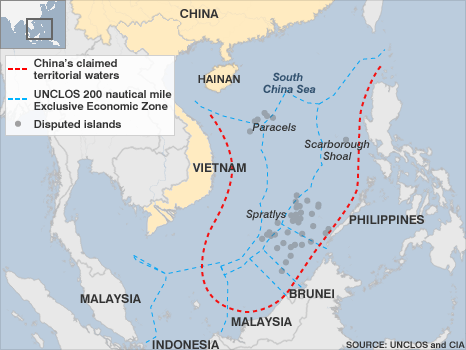TimeGhost
Published on 14 Feb 2018D is for dollars, 100 to the penny,
Some have but few, others have many,
Some hoard them too – the frugal and mean,
And none was more frugal than one Hetty Green.Hosted and Written by: Indy Neidell
Based on a concept by Astrid Deinhard and Indy Neidell
Produced by: Spartacus Olsson
Executive Producers: Bodo Rittenauer, Astrid Deinhard, Indy Neidell, Spartacus Olsson
Edited by: Bastian BeißwengerA TimeGhost format produced by OnLion Entertainment GmbH
February 15, 2018
DicKtionary – D is for Dollars – Hetty Green
HMS Sutherland to conduct Freedom of Navigation exercise (FONOPS) in the South China Sea
Gareth Corfield on the current voyage of the Royal Navy frigate HMS Sutherland (F81):

HMS Sutherland (F81), a Type 23 frigate of the Royal Navy
Photo by Vicki Benwell, RN and released by the Ministry of Defence.
A British warship has set sail for the South China Sea, paving the way for aircraft carrier HMS Queen Elizabeth to do the same thing in three years’ time.
HMS Sutherland, a Type 23 frigate, will sail through the disputed region on her way home from Australia, as much to fly the flag in foreign climes as to carry out a dry run ahead of the nation’s flagship doing the same thing in 2021.
The South China Sea is one of the world’s naval choke points. Very high values of trade (the total value was estimated by the Daily Telegraph as £3.8tn) either originates in or passes through the sea. The region is under dispute chiefly because of China, which is trying to extend its territorial limits (and thus the area it can directly control) by building artificial islands to embiggen its borders.
Sutherland will be carrying out a freedom of navigation exercise, which is where a warship sails through a disputed bit of sea to send the message “you can’t stop us doing this”. The idea is to reinforce the notion that international waters, where anyone has right of free passage, can’t be unilaterally claimed by one country.
The Martian Chronicles – The New Martians – Extra Sci Fi – #13
Extra Credits
Published on 13 Feb 2018Ray Bradbury’s last Martian story, “The Million Year Picnic,” offers a much more optimistic look at humanity. We have proven ourselves very capable destroyers, but we also have the capacity to improve and learn from our mistakes.
The rise of the bourgeoisie
Ed West on the beginning of the end of military aristocracy in Europe and the rise of the merchant class:
The medieval system began with the Franks, whose mastery of cavalry made them the most powerful tribe in the former western empire. Later, the Normans used horses in far larger numbers and developed the cavalry charge, used to lethal effect at the Battle of Hastings. Cavalry underpinned the European social order because only those with a reasonable amount of land could afford the destrier warhorse, which cost 30 times as much as a regular farm animal and could carry up to 300lbs in weight, including 50lbs of iron armor — itself very costly.
The sons of the aristocracy were mostly schooled in warfare from a young age and despised learning and trade, which were viewed as dishonorable, leading to an excess of landless younger sons whose only skill was fighting, many of whom found their way to wars, or caused them, or made a living at absurdly dangerous tournaments. Cavalry developed certain rules — chivalry, which primarily concerned the treatment of aristocratic prisoners — as well as an idealization of the aristocratic warrior through the stories of Arthur, Lancelot, and Roland that singers recited at the courts of dukes and counts.
This order was first shaken in 1302 when France’s cavalry confidently marched north to suppress a revolt by the Flemish. Flanders is not naturally rich in resources — Vlaanderen means flooded — but its people had turned swamps into sheep pastures and towns, building a cloth industry that made it the wealthiest part of Europe, its GDP per capita 20 percent greater than France and 25 percent better than England. The wealth of Flanders’ merchants was such that when Queen Joan of France visited, she afterward wrote in horror that: “I thought I would be the only queen there, but I find myself surrounded by 600 other queens.”
The Flemish were traders, not knights, which is why the French were sure of victory. And yet, with enough money to pay for a large, well-drilled infantry, they were able, for the first time, to destroy the cavalry at the Battle of the Golden Spurs. It was the beginning of the end. No longer could the aristocracy simply push around the bourgeoisie, and as the latter grew in strength, it undermined the violence-obsessed culture of the nobility.
[…]
The aristocratic class that wished for glory in battle was in retreat, and yet, despite this, won the narrative. While in exile in Burgundy, King Edward had met a London merchant by the name of William Caxton who in his spare time transcribed books for aristocratic women. Exhausted at the toll of work, he learned through business contacts of a new technology in Germany, called movable type; when Caxton brought a printing press back home one of the most successful books he published was Thomas Malory’s The Death of Arthur.
It became the influential work in celebrating the Heroic Narrative of the Middle Ages, but the aristocratic ideals it harked back to were mostly a sham and ultimately rested on the rusty sword (and Malory was a convicted rapist). No account of any trader or banker could ever compete with these knights’ tales, of course, and yet you could argue that they were the real heroes who shaped our world.
The Volkswagen Thing Is Slow, Old, Unsafe… and Amazing
Doug DeMuro
Published on Oct 13, 2016GO READ MY COLUMN! http://autotradr.co/Oversteer
Thank you to Morrie’s Heritage Car Connection for letting me borrow your Thing!!
http://morriesheritage.com/
QotD: Computer models
How can one be certain about outcomes in a complex system that we’re not really all that good at modeling? Anyone who’s familiar with the history of macroeconomic modeling in the 1960s and 1970s will be tempted to answer “Umm, we can’t.” Economists thought that the explosion of data and increasingly sophisticated theory was going to allow them to produce reasonably precise forecasts of what would happen in the economy. Enormous mental effort and not a few careers were invested in building out these models. And then the whole effort was basically abandoned, because the models failed to outperform mindless trend extrapolation — or as Kevin Hassett once put it, “a ruler and a pencil.”
Computers are better now, but the problem was not really the computers; it was that the variables were too many, and the underlying processes not understood nearly as well as economists had hoped. Economists can’t run experiments in which they change one variable at a time. Indeed, they don’t even know what all the variables are.
This meant that they were stuck guessing from observational data of a system that was constantly changing. They could make some pretty good guesses from that data, but when you built a model based on those guesses, it didn’t work. So economists tweaked the models, and they still didn’t work. More tweaking, more not working.
Eventually it became clear that there was no way to make them work given the current state of knowledge. In some sense the “data” being modeled was not pure economic data, but rather the opinions of the tweaking economists about what was going to happen in the future. It was more efficient just to ask them what they thought was going to happen. People still use models, of course, but only the unflappable true believers place great weight on their predictive ability.
Megan McArdle, “Global-Warming Alarmists, You’re Doing It Wrong”, Bloomberg View, 2016-06-01.




